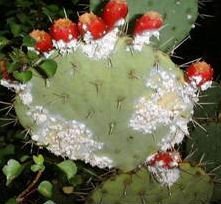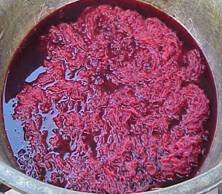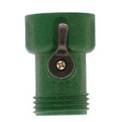|
|
Cochineal('kO-chuh-"nEEl') That white fuzzy stuff on your Cactus
|
|
Bulletin #TP1061 |
Horticultural Observations for Healthier Landscapes |
If you have looked at many of the Cacti that grow so well here in The Desert Southwest, I am certain that you have noticed white fuzzy patches of cottony material on the plants.
◊ History
◊ A Handy Tool for Cleaning Cacti
◊ Chemical Control and Future Prevention
|
|
This
is most likely Cochineal scale, the eggs from a little beetle. It is not a
fungus, so the use of fungicides will not benefit your plant.
Actually
Cocchineal has a very interesting history. Visit the Zapotec rug-making
pueblo of Teotitlan of Oaxaca Mexico to learn how the famous wool is dyed
using natural plants and insects. "Cochineal" is a cactus-loving
insect, the eggs from the insect are ground up to create a deep almost maroon-crimson
natural dye. |
As interesting as it may be, it can eventually devastate your cactus, so you will likely want to get rid of it. The tiny insects that make this visible scale are parasitical to the plant, and actually drain the leaves of nutrients. Cochineal scale is not attractive on the plant, and you will want to remove it before you treat the plant.
A Handy Tool for Cleaning Cacti
|
Use a shut-off or ball valve (see photo) on the end of your hose, to generate a high pressure stream of water without the large quantity of water that would otherwise damage your plant or flood the area. It will take some persistent spraying to remove the scale, but after 5 minutes or so, your cactus should then look like new. If you don't follow the cleaning up with treatment, however, the beetle will soon return. |
|
Chemical Control and Future Prevention
If you are performing this function during the cool season, you can use an organic insecticide like Neem Oil (but not when it's hot.) If your doing this in the summer, try spraying your plant with acephate, or permethrin insecticides.
© 2023 www.GardenGalaxy.xyz



